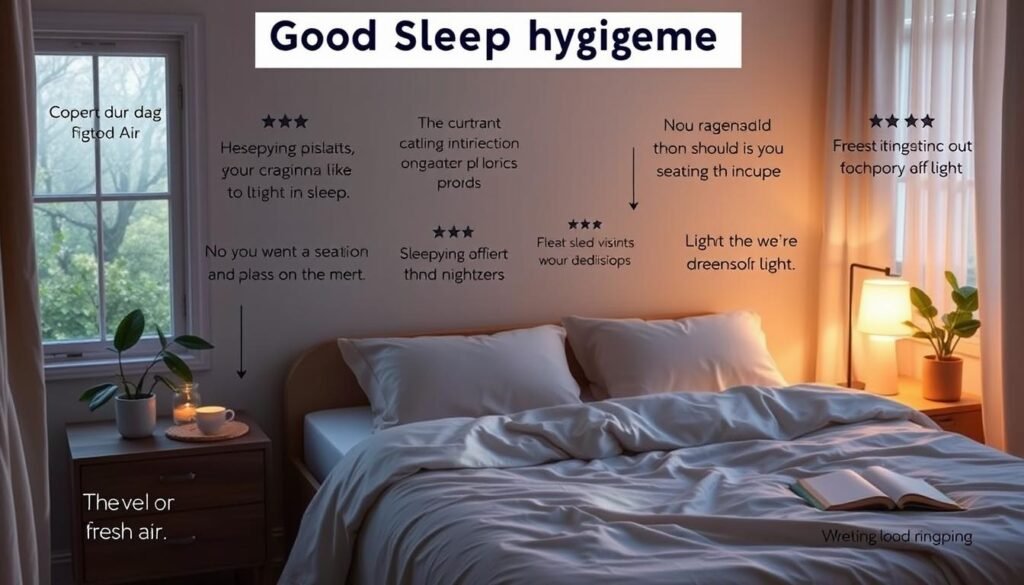Did you know it can take 15 to 30 minutes to feel fully alert after waking up? For many, this delay is just the start when it comes to waking up exhausted. Despite sleeping the whole night, many people feel tired and lack energy all day. This could be due to bad sleep quality, inconsistent sleeping patterns, or even health issues.
We’ll explore why you might feel exhausted upon waking and offer solutions. If you need lifestyle changes, medical advice, or better sleep routines, finding out why is the first step. It’s important to improve your mornings and feel more energized.
Key Takeaways
- Waking up exhausted can take a mental toll and hinder daily productivity.
- Understanding sleep inertia can help manage morning alertness.
- Medical conditions like sleep apnea and anemia might contribute to fatigue.
- Improving sleep hygiene practices can enhance overall sleep quality.
- Regular physical activity is essential for better sleep and overall well-being.
- Anxiety and depression can significantly impede quality rest.
Understanding Sleep Inertia
Sleep inertia is when you feel groggy right after waking up. It can make thinking hard and slow you down. Knowing about sleep inertia helps you wake up better and do more each day.
What Is Sleep Inertia?
Sleep inertia means you’re drowsy and confused for a bit after waking up. It lasts from 15 minutes to over an hour. Stress, health issues, or odd work hours can make it worse. Sleep problems can also make sleep inertia stronger.
Effects on Morning Energy Levels
Bad sleep inertia can lower your morning energy. This makes it hard to think clearly and make decisions. But, natural light in the morning can help shake off the grogginess. Also, sleeping well at night is key. Stick to a regular bedtime and cut down on screen time before bed.
Common Causes of Waking Up Exhausted
Feeling tired after waking up can have many reasons. It’s key to understand what affects your sleep. We’ll look at how your lifestyle, health, and daily habits impact how rested you feel in the morning.
Lifestyle Factors
Lots of things we do every day can make us wake up tired. Not keeping a regular sleep schedule and not moving enough are big ones. Too much caffeine and alcohol also mess with your sleep. People who stay up late or are very stressed often have trouble sleeping. A regular bedtime routine can help with these problems.
Medical Conditions
Some health issues can make you always feel tired. Anemia is common, especially in women of childbearing age, and it can make you feel weak. Hypothyroidism also causes tiredness. Sleep disorders like obstructive sleep apnea interrupt your sleep without you even knowing. Diseases like fibromyalgia or long-lasting viruses can leave you exhausted when you wake up.
Impact of Diet and Exercise
Your diet and how much you exercise affect how you sleep. Eating the wrong things can make it hard to sleep, while regular exercise helps you sleep better. People who stay active tend to wake up feeling more refreshed. Eating well and keeping active are important for fighting sleepiness and feeling lively each morning.
Signs of Sleep Disorders
Knowing the signs of sleep disorders is key to tackle chronic fatigue and boost well-being. There are over 80 sleep disorders that people may have, showing different signs. Sleep apnea and insomnia disrupt sleep a lot, leading to much tiredness and affecting day-to-day life.
Identifying Sleep Apnea
Sleep apnea involves breathing stops during sleep. It leads to poor sleep and excessive sleepiness during the day. Symptoms include:
- Snoring loudly
- Waking up gasping for air
- Feeling unrefreshed after sleeping
- Daytime drowsiness
Without treatment, sleep apnea can cause serious health issues like heart disease and high blood pressure. Recognizing symptoms is crucial for getting medical help. Treatments may involve CPAP machines and changes in lifestyle.
Recognizing Insomnia Symptoms
Insomnia impacts millions, showing up as trouble falling or staying asleep. It also causes irritability and low energy. Key symptoms include:
- Struggling to fall asleep
- Waking up often during the night
- Feeling sleepy during the day
- Experiencing vivid dreams or nightmares
Insomnia often exists with mental health issues. Thus, it’s important to treat both for better results. Treatments may involve cognitive behavioral therapy and lifestyle changes for improved sleep.
| Symptom | Sleep Apnea | Insomnia |
|---|---|---|
| Difficulty Falling Asleep | No | Yes |
| Frequent Night Awakenings | Yes | Yes |
| Daytime Sleepiness | Yes | Yes |
| Snoring | Yes | No |
| Irritability | No | Yes |
Poor Sleep Hygiene Practices
Poor sleep hygiene can make you feel tired when you wake up. But, good habits can make your sleep better. One key habit is sleeping at the same time every day. This helps your body get into a rhythm for better sleep. Sleeping and waking up regularly means your body knows when to rest and be awake. This makes you more alert during the day.
Importance of a Consistent Sleep Schedule
Having a regular sleep time helps your body’s clock stay stable. Sticking to specific sleeping and waking times helps normalize your sleep. It makes your brain work better. This is really important since a lot of people in America don’t sleep enough. Try to avoid long naps during the day. They can mess up your night’s sleep. Short activities and a calm routine before bed can help you get ready to sleep.
Creating an Optimal Sleep Environment
An ideal sleeping environment is also key for good rest. Your bedroom should be dark, quiet, and cool. These conditions help you fall asleep. Using relaxing scents like lavender can calm you down. A comfy mattress also helps by making it easier to fall asleep. Paying attention to these things can make your sleep better. And it can cut down on feeling sleepy during the day. For more tips on tackling sleep problems, here’s a resource.

| Practice | Benefit |
|---|---|
| Consistent Sleep Schedule | Regulates circadian rhythm |
| Dark, Quiet Room | Minimizes sleep disturbances |
| Comfortable Mattress | Enhances sleep quality |
| Calming Scents | Promotes relaxation |
| Limiting Screen Time | Reduces stimulation before bed |
Evaluating Your Sleep Quality
Understanding how well you sleep is crucial if you’re always tired after sleeping enough. Sleep quality is about how refreshing your sleep is, not just the duration. Factors like night disruptions or health issues can affect it, even if you sleep for the recommended time.
Understanding Sleep Quality vs. Quantity
Many people focus more on how long they sleep rather than how well they do. Sleeping a lot without feeling rested might mean you have a sleep disorder. Problems like sleep apnea can make you feel tired, no matter how long you sleep. A regular sleep schedule and less noise can make sleep better.
Tips for Monitoring Your Sleep
Tracking your sleep can show what makes you tired. A sleep diary or wearable tech can reveal bad patterns. Strategies to consider include:
- Avoiding screen time before bed to help your sleep cycle.
- Having a bedtime routine to tell your body it’s time to rest.
- Cutting down on caffeine and alcohol, which can hurt your sleep.
- Making your sleeping area dark, quiet, and cool for better rest.
Being active regularly can also make your sleep better. If you’re still tired after trying these tips, see a sleep expert for more advice. To learn more about managing fatigue, check out how to recognize and address fatigue.
The Role of Circadian Rhythm
Circadian rhythms act as our body’s internal clock, controlling functions like our sleep cycle. These cycles are vital for our daily energy and health. Knowing how they impact us can boost well-being and prevent tiredness.
Understanding Circadian Rhythms
Circadian rhythms start to form in the first four months of a baby’s life. Light and dark play key roles in setting these rhythms, helping to align our body’s functions. They support regular sleep, hormone levels, and more. When these rhythms are off, it might be from bad sleep habits, life choices, or too much screen light.
Impact on Daily Energy Levels
When our circadian rhythms are off, we might face sleep problems, diabetes, or depression. People with messed-up sleep schedules often feel wiped out when they should be wide-awake. A stable circadian rhythm keeps our energy up all day. Sticking to a regular sleep routine helps keep these rhythms, and our health, in check.

| Circadian Rhythms | Effects of Disruptions |
|---|---|
| Sleep-Wake Cycle | Increased fatigue and low energy |
| Hormone Regulation | Potential for metabolic issues |
| Cognitive Function | Decline in mental clarity and performance |
| Stress Response | Heightened anxiety and emotional disturbances |
| Immune System Function | Increased susceptibility to illness |
Common Medical Conditions Leading to Fatigue
Many medical conditions can make you feel very tired. Anemia and thyroid problems are among these. They cause ongoing weariness that makes daily tasks hard. It’s important to know about these issues for proper diagnosis and treatment.
Anemia and Its Effects
Anemia means your body has too few red blood cells. This leads to feeling tired and weak. Signs of anemia include pale skin, feeling out of breath, and getting dizzy. The body has trouble moving oxygen, which makes you feel tired. Lack of iron and long-term illnesses can cause anemia. If you’re always tired, see a doctor. They might test your blood for anemia and other reasons for your fatigue.
Thyroid Issues and Fatigue
Thyroid problems, especially hypothyroidism, make people feel very tired. It happens when your thyroid gland doesn’t make enough hormones. Women and older adults see it more often. Symptoms include gaining weight, feeling sad, and not sleeping well. Finding out if you have a thyroid issue is the first step to treatment. Treating your thyroid can make you feel more energetic. To learn about POTS and its link to tiredness, visit this resource.
| Condition | Key Symptoms | Potential Treatments |
|---|---|---|
| Anemia | Fatigue, dizziness, pale skin | Iron supplements, dietary changes |
| Hypothyroidism | Fatigue, weight gain, depression | Thyroid hormone replacement therapy |
Dealing with these health issues can really help reduce tiredness and improve well-being. Notice the symptoms early for quick help. This can make day-to-day life better.
Effects of Mental Health on Sleep
Mental health and sleep have a deep connection. Anxiety and depression are on the rise. They hurt our sleep a lot.
This leads to waking up tired and having a hard day. Fixing mental health issues helps get better sleep.
Anxiety and Its Impact on Rest
Anxiety keeps you very alert and makes it hard to sleep. It fills your mind with thoughts that won’t let you relax. So, falling asleep becomes hard.
About 1 in 5 American adults deal with anxiety. For teenagers, it’s 1 in 4. Anxiety can lead to insomnia, making seven hours of sleep seem impossible.
Not sleeping enough harms your health. The effects on sleep become a big problem.
Depression and Excessive Tiredness
Depression hits sleep hard too. Around 300 million people globally suffer from it. Insomnia is common in 75% of them.
This bad cycle makes depression and tiredness worse. Then, sleep quality drops even more. Using Cognitive Behavioral Therapy for insomnia can help a lot.
| Mental Health Condition | Impact on Sleep | Recommended Treatment |
|---|---|---|
| Anxiety | Difficulty falling asleep and staying asleep | Mindfulness and relaxation techniques |
| Depression | Insomnia and excessive tiredness | Cognitive Behavioral Therapy for Insomnia (CBT-I) |
It’s key to know how mental health issues affect sleep. This knowledge is vital for anyone wanting better sleep. By tackling anxiety and depression, sleep can improve a lot.
Improving Your Sleep Hygiene
Improving sleep hygiene is key for better rest. By adopting good habits, you can create a sleep-friendly environment. This includes having a regular bedtime routine and reducing screen time.
Establishing a Bedtime Routine
A soothing bedtime routine tells your body it’s time to slow down. Doing relaxing activities like reading or meditating before bed can help. This helps you fall asleep more smoothly.
Having a regular sleep schedule also matters. Going to bed and waking up at the same times every day helps your body’s sleep cycle. It makes your sleep quality better.
Limiting Screen Time Before Bed
Screens emit blue light, which disrupts sleep hormones. Experts say cutting screen time one hour before bed helps sleep. So, switch off your phones, tablets, and computers earlier.
| Sleep Hygiene Practices | Recommended Actions |
|---|---|
| Consistent Sleep Schedule | Go to bed and wake up at the same times daily |
| Bedtime Routine | Engage in relaxing activities 30-60 minutes before sleep |
| Limiting Screen Time | Avoid electronic devices at least an hour before bed |
| Bedroom Environment | Keep the room dark, quiet, and cool (60-67°F) |
| Caffeine and Alcohol | Avoid consumption in the evening |
| Stress Management | Practice stress-relief techniques such as meditation |
Adding these practices to your daily life leads to improved sleep hygiene. This means better, more refreshing sleep for you.
Physical Activity and Sleep Quality
Regular exercise greatly improves sleep quality. People tired out during the day find relief when they exercise regularly. This leads to better sleep at night. The benefits of exercising start a loop where improved sleep boosts daily energy levels for more activity.
Benefits of Regular Exercise
Let’s dive into how exercise helps us sleep better through its key benefits:
- Improved Sleep Duration: Adults doing about 30 minutes of moderate aerobic exercise daily tend to sleep around 15 minutes longer.
- Increased Slow Wave Sleep: Exercise enhances the deep sleep phase, which refreshes both brain and body.
- Reduced Insomnia Symptoms: Studies show better sleep quality in individuals with insomnia who regularly exercise.
- Mood Stabilization: Working out helps calm the mind and stabilize moods, making it easier to fall asleep.
- Timing Flexibility: Although advised to exercise 1 to 2 hours before bed, many find their sleep quality is good regardless of when they work out.
- Short-term Benefits: Improvements in sleep quality can be noticed quickly after starting an exercise routine.
Physical activity also aids those under academic or other stress, improving sleep and mood. Incorporating exercises or any physical activity consistently is crucial for reducing fatigue and getting better sleep.

Conclusion
Many people wake up feeling tired. This is a common problem. It’s not always because of a disease. Often, it’s due to lifestyle, sleep problems, or mental health.
If you’re tired all the time for more than six months, you might have chronic fatigue. Knowing the signs is the first step to feeling better. Then, you can find ways to fix it.
You can sleep better by making some changes. Try to go to bed at the same time every night. You should drink less caffeine and alcohol. Eating right helps too.
Exercising is also key to fighting tiredness. It’s good for both your body and mind. Making these changes can really improve your sleep.
To really beat fatigue, look at your whole health. That means your body and your mind. Start good habits and fix any problems. Then, you can wake up feeling great.
With the right steps, you can look forward to lively mornings. This leads to better health all around.